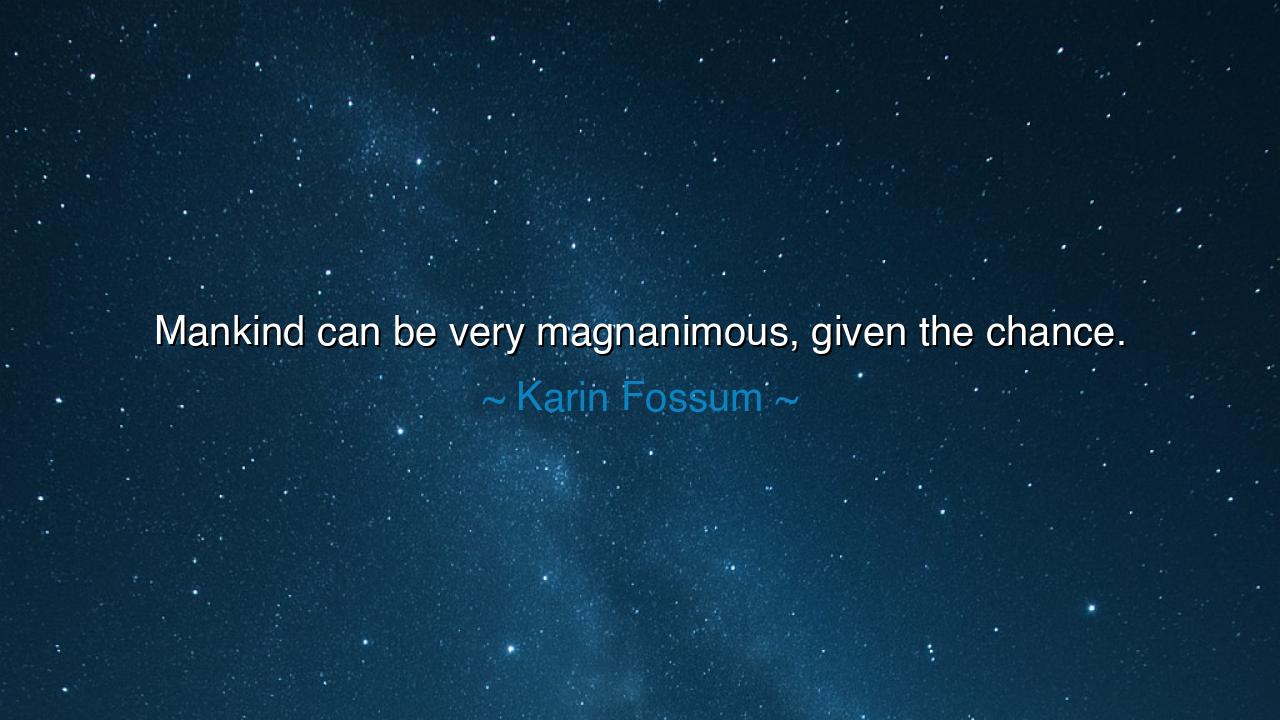
Mankind can be very magnanimous, given the chance.






In the journey of humanity, there lies an eternal truth: we are capable of both great cruelty and profound generosity. Karin Fossum, in her reflection, speaks to the noble side of human nature when she says, “Mankind can be very magnanimous, given the chance.” In this simple but powerful statement, Fossum calls us to recognize that deep within the human heart resides the potential for greatness and compassion—but it is often circumstance and opportunity that bring these qualities to the forefront. In the absence of hardship or conflict, we may not see the depth of this magnanimity, but when tested, the human spirit often reveals its capacity for kindness, forgiveness, and selflessness.
The ancients understood this duality within humanity. The great Greek philosophers, such as Socrates and Aristotle, spoke of the noble nature of man, the potential for virtue and generosity that lies within each of us. Yet, they also understood that virtue must be cultivated, it must be tested, and it must be given the opportunity to flourish. Socrates often engaged with his fellow citizens, urging them to examine their souls and their actions, to reach toward a higher form of goodness. In this sense, Fossum’s quote echoes the timeless truth that magnanimity is not simply a quality we possess but one that must be nurtured through circumstances that bring out the best in us.
Consider the stories of ancient heroes, whose acts of magnanimity became legendary, shaping the cultures they inhabited. Take, for example, the story of Alexander the Great, who, after conquering much of the known world, demonstrated remarkable magnanimity toward those he defeated. When he conquered the city of Thebes, he spared the lives of many of its citizens, showing mercy where others might have shown brutality. This act of kindness, amidst the chaos of war, became a defining moment in his life—a testament to the power of magnanimity even in the face of great power. Like Alexander, the ancients understood that greatness is measured not just by victories, but by the ability to show compassion and forgiveness when given the chance.
In the modern world, we are often reminded of the capacity for magnanimity that exists within humanity through moments of crisis. Consider the example of the aftermath of World War II, when nations torn apart by conflict began the slow process of reconciliation. Nelson Mandela, in his leadership of South Africa, exemplified magnanimity in a way that resonates with Fossum’s reflection. Having spent decades in prison, Mandela could have emerged from his captivity with bitterness and anger. Instead, he chose the path of forgiveness, knowing that the future of his nation depended not on retribution but on healing and unity. His actions, like those of the ancient heroes, demonstrated the profound magnanimity that can emerge when a leader, and a people, are given the chance to rise above their past wounds and work toward a common good.
The story of Gandhi is another example of this idea in action. Mahatma Gandhi, though faced with immense oppression and injustice under British rule, advocated for a path of nonviolence and forgiveness. He famously declared, "An eye for an eye makes the whole world blind," embodying the belief that true strength lies not in vengeance, but in magnanimity. Gandhi’s leadership showed that when given the chance, humanity has the capacity to choose peace over violence, unity over division, and compassion over hatred. In this, he demonstrated that magnanimity, though rare, can be a guiding force in shaping the future.
Fossum’s words challenge us to reflect on our own lives and our potential for magnanimity. In a world often marked by conflict, division, and hardship, it is easy to focus on the failings of others, to become entrenched in bitterness and anger. Yet, magnanimity asks us to rise above the impulse for revenge or retaliation, to see beyond the faults of others and choose forgiveness and kindness instead. This is not always easy, but it is a choice we must make when faced with the opportunity. Whether in our personal relationships, our communities, or on the larger stage of global conflict, the potential for magnanimity lies within us all.
Thus, let us take Fossum’s reflection to heart: mankind, at its best, is capable of great magnanimity, of selfless acts of kindness and forgiveness. These acts of greatness, however, are not always born from the most favorable of circumstances. They are often brought to the surface when we are given the chance to rise above the ordinary and embrace the extraordinary virtues of compassion and grace. In our own lives, let us seek to foster this magnanimity—to choose understanding over judgment, to offer kindness in the face of conflict, and to forgive when it seems easiest to hold on to anger. For in these choices, we find not only the best of humanity, but also the key to a future filled with peace and unity.






AAdministratorAdministrator
Welcome, honored guests. Please leave a comment, we will respond soon